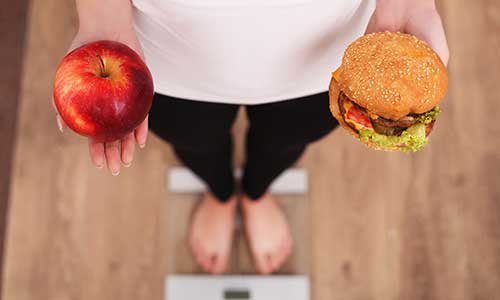The emotional rollercoaster of weight loss
- Overview
When you’ve been living with excess body fat, losing weight can feel like a great achievement. But the journey to get there can feel like an emotional rollercoaster. Here are some of the situations you may encounter, and what you can do about them.
It takes time to see results
When you’re working really hard in the gym and eating right, it can be frustrating when you don’t see results as quickly as you want to or if the weight loss starts to tail off.
At first, you may find the number on the scale drops quite quickly but starts to slow down after a while, even though you’re working just as hard. Muscle weighs more than fat, so if you’re building muscle it’s likely your weight may even go up.
It’s perfectly normal, in women in particular, for weight to fluctuate by up to 10lbs a month, especially around their period. Try not to use the scale as your main measurement of success. A tape measure is a much more accurate way to keep track of your progress.
Don’t be tempted to overdo it in the gym to lose weight faster, as this can lead to burn out and make you not want to go back. If you're a Nuffield Health member, book in for regular Health MOTs to keep track of your progress over time.
What you can do
- Remember muscle weighs more than fat
- Book in for regular Health MOTs
Relationship problems

When you’ve made changes to your routine but your partner hasn’t, it can cause friction in your relationship. If your partner isn’t on board with your new lifestyle, it can make you both feel resentful and cause arguments.
Many relationships are based around food; eating out or bonding over meal times, so if you’re no longer bonding over this, it may create unbalance in your relationship. Try to find foods that you both enjoy that are also healthy. If you share a love of takeaway pizza, why not try cooking a healthier version together? You’ll also get some quality time and may find you’re spending more time with each other than before.
Your new body may also attract attention from friends, family or even strangers and your partner might be jealous or resent this. It can be hard to reassure your partner, especially if they don’t agree with your new lifestyle, but try explaining why you want to make the changes you have – to be able to do more together, to be healthier and live a more active life.
Hopefully somewhere in your new routine, whether that’s cooking, walking or doing a class together, you’ll be able to find a new hobby for you to both enjoy.
What you can do
- Find another common interest that isn’t food
- Make quality time for each other
- Try to find a new hobby to do together based on your new lifestyle.
Mood swings
Although leading a healthier lifestyle should improve your mood in the long-term, changing your diet and lifestyle can be difficult to adjust to at first. You might feel stressed if you haven’t yet established a long-term routine, or if you’re having to fight the temptation to reach for your usual food or drink treats.
If you’ve changed your diet, it can make you feel irritable as your body gets used to consuming less sugar. Stick with it – it will get easier as your body’s sugar levels rebalance.
If you’re feeling consistently hungry and unsatisfied throughout the day, especially if you’re dizzy or light-headed, you probably aren’t consuming enough calories. Make sure you’re fuelling your body with the right nutrients to keep your energy levels up.
What you can do
- Establish a long-term routine
- Be patient and wait for your body to adjust
- Ensure you’re consuming enough calories.
Excess skin
Losing a large amount of body fat takes hard work and is a great achievement, but sometimes you can be left with excess skin. To minimise this, try to lose weight steadily and slowly, aiming for around a 1-2lb weight loss per week to give your skin time to adjust.
You may find that over time that loose skin becomes less noticeable, but if not, surgery is an option for some people. Surgeons generally recommend waiting at least one year before considering surgery, in order to give your weight a chance to stabilise. Any surgery has risks, so consider whether this option is right for you.
Remember to celebrate the fact you are much healthier inside and out and that is the most important thing.
What you can do
- Lose weight slowly and steadily
- Remember you’re healthier through and through.
Emotional Eating

When you’re out and about, it can be difficult to avoid the temptations of junk food, especially if everyone around you is eating all the unhealthy foods you once loved. Try to eat mindfully, not emotionally and make choices that you will be happy with later.
First of all, recognise when you’re eating emotionally; this usually relates to stress, boredom, or is aimed at rewarding yourself rather than satisfying hunger. For example, driving for four hours and deciding to stop and reward yourself with a hot chocolate with cream and biscuits. This type of hunger will be in the head, rather than actual hunger which comes on slowly and is located in the stomach.
To avoid last-minute unhealthy fast food choices, try to pre-plan your meals as much as possible and take food with you, so you won’t be tempted. Stop to eat when you’d normally eat so that you can avoid feeling ravenous and reaching for unhealthy food. Stopping to eat means you can eat mindfully and concentrate on what you’re doing.
If you do give in and reach for a chocolate bar or a glass of wine, don’t beat yourself up. Remember, it’s all about balance and being able to sustain your new lifestyle long term, so treats are ok sometimes.
What you can do
- Be mindful of your cravings
- Pre-plan meals
- Keep mealtimes regular.
Last updated Friday 7 October 2022
First published on Monday 24 December 2018

